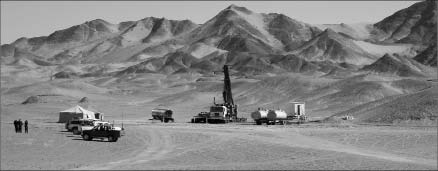A mining licence dispute for the sizable Reko Diq copper-gold project in Pakistan’s southwest Balochistan province potentially nears its end, after much uncertainty.
On May 26 Reuters reported that according to Pakistani officials, the provincial government will release a verdict on the mining licence in early June.
A day before the news, Pakistan’s Supreme Court gave the Balochistan government the right to grant the mining licence for
the project, which is owned by Barrick Gold (ABX-T, ABX-N) and Chile’s Antofagasta (ANTO-L).
Each company owns half of the Tethyan Copper joint-venture (JV), which has a 75% interest in Reko Diq, while the Balochistan government owns the remainder.
Reko Diq is an “outstanding deposit, and also technically fairly straightforward,” Barrick’s CEO Aaron Regent commented at a recent Goldman Sachs (GS-N) basic materials conference in New York. “It just happens to be located in a very challenging country.”
Earlier this year, Pakistan’s Supreme Court restrained the local government from handing out a mining licence. It heard several constitutional petitions, which raised competing claims for the property and how best to develop it, with some government officials arguing that Pakistan would benefit from developing the project on its own, or by seeking a Chinese partner.
Currently, China is one of the country’s leading foreign investors. A Chinese company already operates the nearby Saindak gold-copper mine in the province.
Simon Rothschild, Antofagasta’s spokesperson, says that the company expected the process would take time, but it
remains optimistic. The application for the licence was filed on Feb. 15, 2011.
He added that while the local authority would handle the granting of the licence, the May 25 declaration also noted that the existing JV is valid, which may end speculations about the subsidiary in some Pakistani media reports.
Reports mentioned that the province’s former advocate general Salahuddin Mengal told the Supreme Court in an earlier hearing that Tethyan did not submit a project fee or feasibility report for Reko Diq, and that some officials were wary of giving the
mining licence to a foreign-owned subsidiary.
However, Barrick and Antofagasta completed a bankable feasibility study and an environmental and social impact assessment on the project, and said that a copy was delivered to the Balochistan government as part of the JV agreement, which includes the local authorities.
The study estimates that Reko Diq would cost $3.3 billion to develop on a 100% basis as a 120,000 ton-per-day operation.
“The price is worth it, in terms of the quality of the deposit,” Regent of Barrick says.
Reko Diq, which sits in the highly prospective Tethyan belt, is comparable to Chile’s Escondida copper mine, says Regent, adding that it is a huge 5-billion-ton orebody grading 1.7% copper-equivalent.
Barrick predicts its share of average annual production for the first five years would be 100,000 oz. gold and 150–160 million lbs. copper, at total cash costs of US$420-US$450 per oz. gold and US$1-US$1.10 per lb. copper.
The company adds that its share of measured and indicated resources are 9.5 million oz. gold, and it has another 6.4 million oz. in the inferred category. For copper, it has measured and indicated resources of 11.7 billion lbs., and another 8.4 billion lbs. in inferred.
Regent says Reko Diq is part of its next-generation projects and is not included in the company’s near-term gold production.
The partners say they have spent a total of $500 million on developing the deposit, which hosts an estimated 5.9 billion tonnes grading 0.41% copper and 0.22 gram gold per tonne, according to Antofagasta’s website.
Regent adds that despite Reko Diq being a great deposit, the company would be “very cautious” in terms of advancing it.
“We will take one step at a time, and make sure that we are totally satisfied from a risk-management perspective that this project is in fact doable,” Regent affirms.


Be the first to comment on "Reko Diq inches closer to a licence"